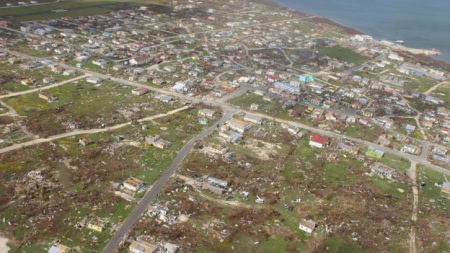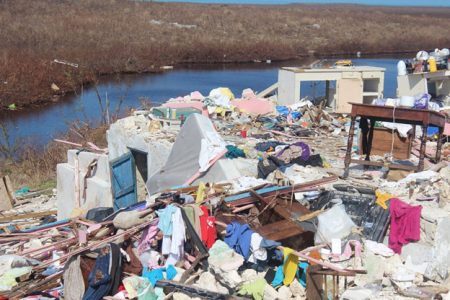By Walter Alexander
The headline “For the first time in 300 years, there is not a single living person on the island of Barbuda” brings to the fore the stark reality of the plight of some small Caribbean states after the recent hurricanes and in the face of over-whelming economic challenges. The devastation and desolation across the affected islands is a wake-up call for our Caribbean politicians and other leaders to forego their fragile independence and work towards genuine integration. Although we know that necessity is the mother of invention, we are not inventing, or even re-inventing, integration. There is now more urgency for a Single Common Market and Economy.
For 200 years the former ‘Mother Country’ and later West Indian political leaders have been advocating greater unity among the English-speaking territories. After the 1958-1962 West Indies Federation (without British Guiana), we have CARICOM today, which is the outcome of CARIFTA, but enough has not been achieved. It is relevant to note that only two CARICOM Members (Guyana and Antigua/Barbuda) observe CARICOM Holiday. When CARICOM nationals visit other CARICOM territories, they hear very little about CARICOM. It is also useful to point out that CARICOM has 15 so-called independent states with 15 Prime Ministers (also 3 Presidents), and 15 National Flags and 15 National Anthems and 15 Coats-of-Arms and 15 ……….. It is further necessary to state that the total population of the 15 CARICOM states is under 6 million (not including Haiti with 10 million) and all 15 territories can be ‘accommodated’ within the borders of Guyana. But unlike Guyana, the economy of these island-states depended heavily upon tourism because of their sand, sea and sun. However, the catastrophic damage wrought by the recent hurricanes in Barbuda


and Dominica and then the astronomical cost of rehabilitation of houses and infra-structure have brought to the fore the question of the viability of the independence of these ‘mini’ states. Hence, CARICOM leaders, from government and opposition parties, now have to revisit the issue of regional integration with a greater degree of urgency. The pedestrian approach is no longer acceptable.
The present situation with climate change, earthquakes, volcanoes and the aftermath of hurricanes forces us to swallow our pride and face reality. We can no longer all be ‘little Caesars’ and hope for aid to bail us out. The leaders and the people in the LDCs (the Less Developed Countries) of CARICOM will have to re-think their concept of sovereignty. We can learn from the experiences of the European Union, in spite of Brexit, although many Britons now seem to have second thoughts. One of our first goals is a Common Currency, that is legal tender from Belize to Guyana and from Jamaica to Barbados, just like the Euro which is spent in the stores from Portugal in western Europe to Romania in the east and from Finland in the north to Greece in the south. Lest we forget, the EU started with 6 countries in 1952, and today it has 28 member countries, with 5 more knocking at the door. The plan our Caribbean leaders must embrace is an incremental expansion of a core of common services, councils and commissions. The egregious success and influence of the Caribbean Examinations Council must be emulated.
In the face of a shortage of competent personnel both in time of disaster and in time of normalcy to fill middle management and ‘top’ positions in the Public Service and Judicial Service of our separate states, would it not be helpful to draw from the larger pool of qualified persons in all regional states? This is of prime importance in the area of jurisprudence when maximum insulation from political pressure and influence is required. After all, we expect our judges to be impartial. The inability of Guyana (which is an MDC) to fill the vacancy of Chancellor and the vacancy of Chief Justice for a period in excess of ten years illustrates the point of the need to have a wider pool of candidates to fill vital positions. Further, in spite of the fact that the Caribbean Court of Justice (CCJ) has been accepted as the final court of appeal for civil and criminal cases by only four regional states, the CCJ is the answer to the urgings of the British Privy Council for all Caribbean states to abandon the Privy Council. And by extension, might not the Regional Judicial and Legal Services Commission be expanded to take on the appointment of Judges (not Magistrates) in all states of the region? As it is not difficult for a Judge in relatively small populations to know or be known sometimes to one or both parties in a matter for litigation, it would be more useful to enhance the perception that justice is seen to be done when judges can be appointed from different states. The benefits that will accrue from further integration of common services can be endless.
At this time of cleaning-up and repairing infra-structure after “Irma” and “Maria”, it is noted that the affected states call upon the services of their Defence Forces. A unified Military Service would have a role to play in drawing more readily upon the resources of the Engineer Corps of the units in the separate states. It would not be a matter of one independent state offering aid to another state, but a matter of one command rising to a challenge in some part of the Union. In time we can even have a unified Police Service Commission, so that vacancies above the rank of Inspector may be filled by suitable candidates from any territory. Later, the implementation of a unified Public Service Commission could be addressed with a view to having a body to deal with the appointment of senior Public Servants. The process of integration can proceed to explore the mechanics of having a Regional Foreign Service and a Regional Civil Aviation Authority. And not only will LDCs stand to benefit, but also MDCs (like Guyana and Trinidad & Tobago) with accusations of racial discrimination.
The ultimate objective of implementing a genuine and vibrant Caribbean Movement is to maximize the benefits to be derived from following the best practices in government across the Caribbean and elsewhere. Small populations mean too much unwanted familiarity with those to be served, and too much nepotism and corruption, often with reluctance by those affected to seek redress or confrontation. In the United Kingdom there is the mechanism of the Fair Trading Act; Jamaica appoints a Fair Trading Commission. Such legislation is yet to see the light of day in other Caribbean territories. In spite of obvious benefits to be derived from expansion of the integration movement, there will still be some resistance by certain interest groups. But the positives will outweigh the negatives.
A major hurdle to be overcome in re-building and re-structuring is the likelihood of increased migration from the LDCs to the MDCs. The answer may be found in the development of Guyana, where the example of the Marshall Plan in Europe after the Second World War could be implemented. Guyana does not experience hurricanes. Consideration should be given to the construction of a new city in the Guyana Hinterland, away from the frequent flooding of the Coastland with its costly sea defence maintenance. Here is an opportunity for the town-planners and architects from Guyana and the Caribbean and beyond to have a field day in setting out their ideas and designs. Let us remember the construction of Brasilia in 1950s and 1960s. And lest we forget; Guyana gave the world the Iwokrama Rain Forest Reserve. It is now pay back time. An approach must be made to the World Bank and CDB and IDB and Canada and USA and the European Union and Australia and Japan and China and the Gulf States and … for funding.
The survival of the smaller states of the Region is so urgent and crucial, that we need all hands on deck. No racial group or community must fear maginalisation. And there is a role to be played by our Elder Statesmen, like ‘Sonny’ Ramphal and P.J. Patterson. We also need the input of the Chancellors and Vice Chancellors of the University of the West Indies and of the University of Guyana. There is much work to be done! Let’s put our shoulders to the wheel.





